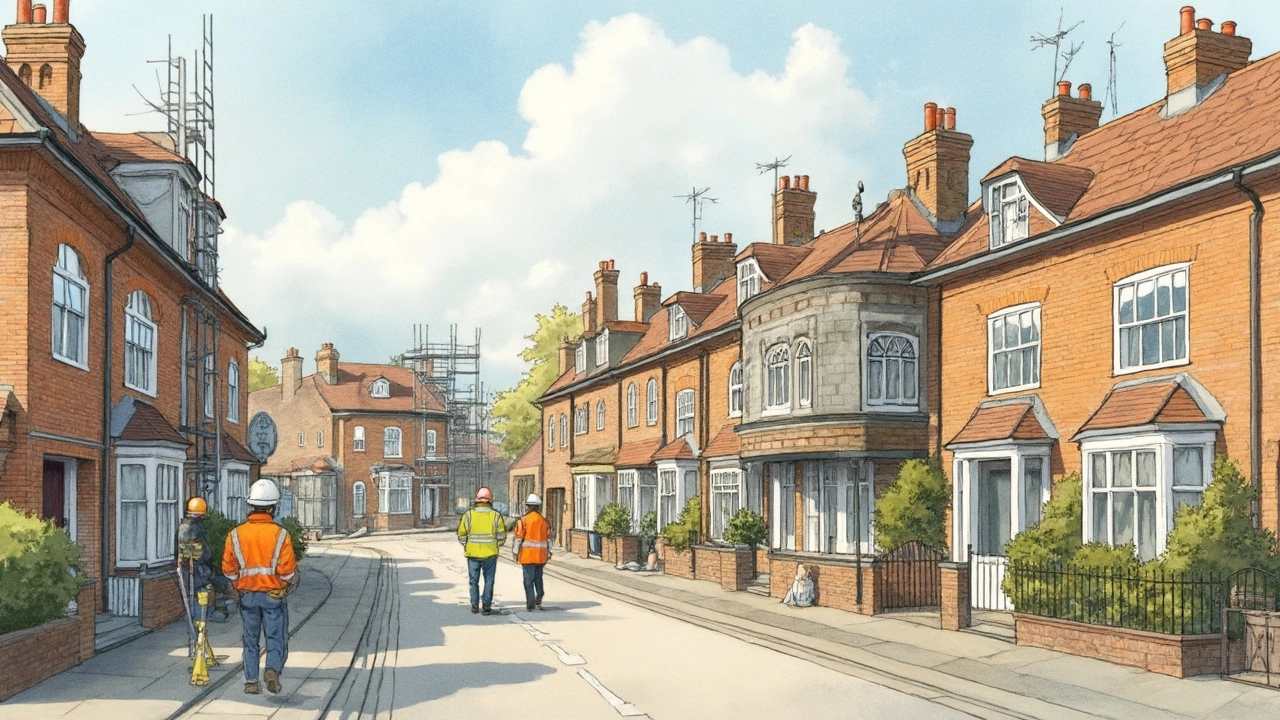Thinking about adding some extra space to your home but not sure whether to build up or expand out? You're definitely not alone in this dilemma. It all comes down to costs, practicality, and your personal needs.
Let's kick off with the cost aspect, where things can get a bit tricky. Building up usually involves less groundwork but might mean extra spending on strengthening the structure. On the other hand, expanding outwards can require more foundation work, which isn't exactly light on the wallet.
Another thing to be mindful of is local regulations. Some areas have height restrictions that could limit upward expansion while others might have setbacks that could impact outward growth. It's crucial to know these rules before making any decisions.
Understanding Costs
When it comes to deciding whether to build up or expand out for your home extension, the financial aspect is a biggie. Many folks get surprised by the extra costs they didn't anticipate. So, let's break down the main cost considerations you should think about.
Building Up
Going vertical might feel like an easy choice if your lot size is limited. But keep in mind that building costs can add up. Strengthening the foundation is often necessary to support additional floors, which can be a significant expense. Plus, don't forget about stairs and potentially adding an elevator, which can also drive up costs.
Expanding Out
On the flip side, extending outward usually means more groundwork. The cost of pouring a new foundation can be hefty, not to mention the potential need to relocate plumbing and electrical lines. You'll also have to consider landscape changes, like tearing out trees or reshaping your yard, which can sneak up on your budget.
Comparing Costs
| Aspect | Building Up | Expanding Out |
|---|---|---|
| Foundation Work | Low to Moderate | High |
| Structural Additions | High | Moderate |
| Landscaping | Minimal | Potentially High |
As you can see from the table, while expanding might look cheaper on paper since it avoids structural reinforcements, the groundwork and landscaping can quickly eat into savings. Always get a detailed quote and take your local pricing into account before making a decision.
Structural Considerations
When you're making the call between building up or expanding out, understanding the structural considerations is key. Let's break down what you need to know when you're thinking of adjusting your home framework.
Building Up
When you go vertical, it's crucial to ensure your existing structure can handle the added weight of a new floor. Older homes might need their foundations strengthened or reinforced, which can sneak extra costs into your building costs. You’ll also need to factor in the disruption during construction, as living areas might be temporarily off-limits during the process.
It's worth checking your local zoning laws too—they can restrict how high you can go, and sometimes getting these approvals can take longer than expected. A good chunk of homeowners in Wellington have found themselves delayed by this step when opting to build up.
Expanding Out
On the flip side, going outwards means more foundation work but less complex structural reinforcement. You may need more land for the project, so if your garden's a prized possession, be prepared to sacrifice some greenery.
The structural requirements can include adding new footings and reworking existing utility connections to accommodate the new spaces. It's often less disruptive to your daily life as the main living areas remain untouched during construction.
Weight of Decisions
Whatever route you take, consulting a structural engineer can provide peace of mind. They can evaluate your current setup and guide you on the most cost-effective and safe choice for your home renovation. Just remember, their insights could pinpoint challenges early, saving you headaches down the road.
Here's a quick comparison for clarity:
| Factor | Building Up | Expanding Out |
|---|---|---|
| Foundation Work | Minimal unless strengthening needed | Significant |
| Structural Reinforcement | Likely necessary | Usually not needed |
| Disruption Level | High | Low |
| Land Requirement | None | Additional land needed |
Weighing these considerations and having a solid plan will help your project run smoothly, whether you're creating a new top level or stretching out across the lot.

Impact on Lifestyle
Deciding whether to build up or expand out can really shake up your daily routine, but in different ways. Let's talk about what might change in your day-to-day life with each option.
Vertical Expansions: Closer to the Sky
When you build up, you're looking at having to deal with construction right above your head. It's not surprising that this might mean more noise and dust, with crews working on the roof structure. On the bright side, going up means you get to keep most of your outdoor space untouched.
One major lifestyle bonus of building up is the potential for better views. If you're lucky enough to live near the coast or have a sweet backdrop to your property, a second or even third story might offer amazing vistas worth the effort.
Horizontal Expansions: Stretching Outwards
Expanding outwards tends to be less intrusive in terms of noise since much of the work is removed from your main living area. Plus, you can stay in your home during construction, with fewer disruptions above your head.
The downside? You might lose some yard or garden space, which could be a bummer if you're a fan of outdoor activities or you have kids or pets who love to run around.
On the upside, ground-level extensions generally make it easier to maintain an open plan design, which many folks love for its airy feel and flow.
Consider Family Needs
If you have young kids or elderly family members, how your home functions can be a big deal. Adding levels might mean extra stairs, which can be tricky for small kids or the elderly. In these cases, a single-story expansion could make more sense.
Ultimately, how either option impacts your lifestyle is tied to your personal preferences and future plans. Whether you prioritize outdoor spaces, need more privacy, or value striking views, weigh these against your household's day-to-day needs and see which option strikes the right balance for your home renovation.
Local Regulations
Before diving into any house extensions, understanding local rules is crucial. In some areas, zoning laws are a big deal, and they could really impact whether it's cheaper to build up or expand. Zoning laws usually regulate the height and space usage of buildings, so that could limit your options right off the bat.
Zoning and Planning
Start by checking with your local council. They often have resources online or available at their offices to help you figure out what's possible. In Wellington, for example, there's a maximum height restriction for residential builds in certain neighborhoods. That could mean going up isn't possible or might require special permission.
Permits and Approvals
Getting the necessary permits can take time. In New Zealand, if your project covers more than 50 square meters, chances are you'll need a resource consent. That's basically a green light from the council allowing you to go ahead with construction. Processing often includes a fee, usually upwards of several hundred dollars, which you should factor into your cost calculations.
Environmental Considerations
Don't forget about environmental rules either. Whether you're looking at a home renovation that involves knocking down trees or working near coastal areas, you might face additional restrictions and costs. These regulations can also influence whether expanding outward or upward is more cost-effective.
In some scenarios, it might even make more financial sense to consult a local architect or planner. They'll not only help you navigate the regulatory maze, but they can provide advice on both compliance and aesthetics. It's an investment up front but could save heaps if they keep you from making a costly mistake.

Author
Damon Blackwood
I'm a seasoned consultant in the services industry, focusing primarily on project management and operational efficiency. I have a passion for writing about construction trends, exploring innovative techniques, and the impact of technology on traditional building practices. My work involves collaborating with construction firms to optimize their operations, ensuring they meet the industry's evolving demands. Through my writing, I aim to educate and inspire professionals in the construction field, sharing valuable insights and practical advice to enhance their projects.